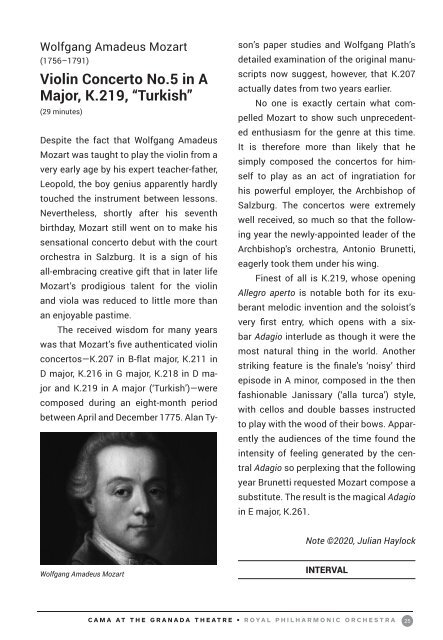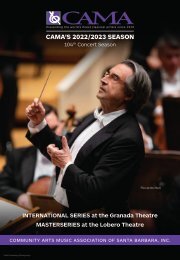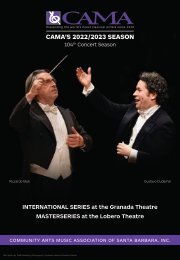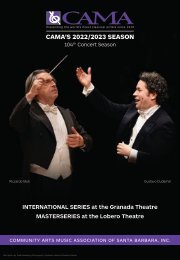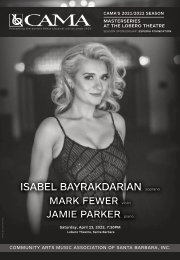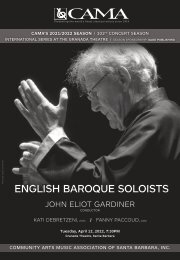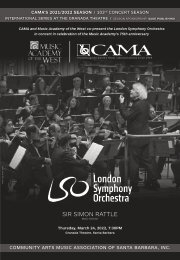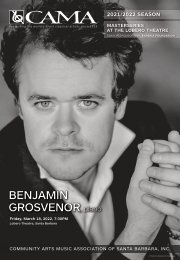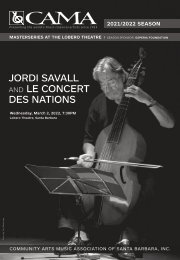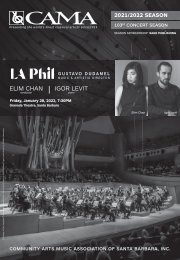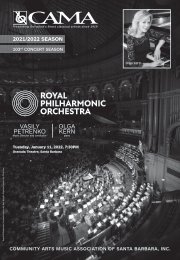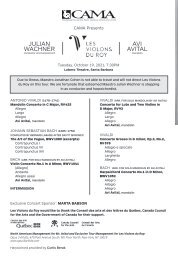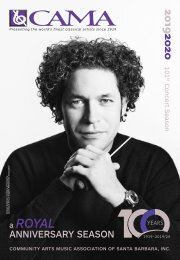Monday, January 27, 2020—CAMA Presents the Royal Philharmonic Orchestra with Pinchas Zukerman—International Series at The Granada Theatre, Santa Barbara
MONDAY, JANUARY 27, 2020, 8:00PM / CAMA Presents the Royal Philharmonic Orchestra / Pinchas Zukerman, conductor and violin soloist / CAMA’s International Series rings in 2020 with the welcome return of London’s ever-popular Royal Philharmonic Orchestra. Formed in 1946 by Sir Thomas Beecham, it has been at the forefront of music-making in Britain for over seven decades, recognized worldwide as one of the United Kingdom’s most prodigious orchestras. In 1966, Queen Elizabeth conferred the title of “Royal” unconditionally on the orchestra. In its self-appointed role as Britain’s national orchestra, the RPO has toured in more than thirty countries across the globe, as well as performing annual concert series at both London’s Royal Festival Hall and Royal Albert Hall. In a career spanning five decades, Pinchas Zukerman (Principal Guest Conductor of the RPO) is universally respected as a virtuoso violinist, violist, conductor and chamber musician with over 100 recordings released to date earning 21 Grammy® nominations. / PROGRAM: TCHAIKOVSKY: “Polonaise” from Eugene Onegin / MOZART: Violin Concerto No.5 in A major, K.219, “Turkish” / TCHAIKOVSKY: Symphony No.5 in E minor, Op.64
MONDAY, JANUARY 27, 2020, 8:00PM / CAMA Presents the Royal Philharmonic Orchestra / Pinchas Zukerman, conductor and violin soloist / CAMA’s International Series rings in 2020 with the welcome return of London’s ever-popular Royal Philharmonic Orchestra. Formed in 1946 by Sir Thomas Beecham, it has been at the forefront of music-making in Britain for over seven decades, recognized worldwide as one of the United Kingdom’s most prodigious orchestras. In 1966, Queen Elizabeth conferred the title of “Royal” unconditionally on the orchestra. In its self-appointed role as Britain’s national orchestra, the RPO has toured in more than thirty countries across the globe, as well as performing annual concert series at both London’s Royal Festival Hall and Royal Albert Hall. In a career spanning five decades, Pinchas Zukerman (Principal Guest Conductor of the RPO) is universally respected as a virtuoso violinist, violist, conductor and chamber musician with over 100 recordings released to date earning 21 Grammy® nominations. / PROGRAM:
TCHAIKOVSKY: “Polonaise” from Eugene Onegin / MOZART: Violin Concerto No.5 in A major, K.219, “Turkish” / TCHAIKOVSKY: Symphony No.5 in E minor, Op.64
You also want an ePaper? Increase the reach of your titles
YUMPU automatically turns print PDFs into web optimized ePapers that Google loves.
Wolfgang Amadeus Mozart<br />
(1756–1791)<br />
Violin Concerto No.5 in A<br />
Major, K.219, “Turkish”<br />
(29 minutes)<br />
Despite <strong>the</strong> fact th<strong>at</strong> Wolfgang Amadeus<br />
Mozart was taught to play <strong>the</strong> violin from a<br />
very early age by his expert teacher-fa<strong>the</strong>r,<br />
Leopold, <strong>the</strong> boy genius apparently hardly<br />
touched <strong>the</strong> instrument between lessons.<br />
Never<strong>the</strong>less, shortly after his seventh<br />
birthday, Mozart still went on to make his<br />
sens<strong>at</strong>ional concerto debut <strong>with</strong> <strong>the</strong> court<br />
orchestra in Salzburg. It is a sign of his<br />
all-embracing cre<strong>at</strong>ive gift th<strong>at</strong> in l<strong>at</strong>er life<br />
Mozart’s prodigious talent for <strong>the</strong> violin<br />
and viola was reduced to little more than<br />
an enjoyable pastime.<br />
<strong>The</strong> received wisdom for many years<br />
was th<strong>at</strong> Mozart’s five au<strong>the</strong>ntic<strong>at</strong>ed violin<br />
concertos—K.207 in B-fl<strong>at</strong> major, K.211 in<br />
D major, K.216 in G major, K.218 in D major<br />
and K.219 in A major (‘Turkish’)—were<br />
composed during an eight-month period<br />
between April and December 1775. Alan Tyson’s<br />
paper studies and Wolfgang Pl<strong>at</strong>h’s<br />
detailed examin<strong>at</strong>ion of <strong>the</strong> original manuscripts<br />
now suggest, however, th<strong>at</strong> K.207<br />
actually d<strong>at</strong>es from two years earlier.<br />
No one is exactly certain wh<strong>at</strong> compelled<br />
Mozart to show such unprecedented<br />
enthusiasm for <strong>the</strong> genre <strong>at</strong> this time.<br />
It is <strong>the</strong>refore more than likely th<strong>at</strong> he<br />
simply composed <strong>the</strong> concertos for himself<br />
to play as an act of ingr<strong>at</strong>i<strong>at</strong>ion for<br />
his powerful employer, <strong>the</strong> Archbishop of<br />
Salzburg. <strong>The</strong> concertos were extremely<br />
well received, so much so th<strong>at</strong> <strong>the</strong> following<br />
year <strong>the</strong> newly-appointed leader of <strong>the</strong><br />
Archbishop's orchestra, Antonio Brunetti,<br />
eagerly took <strong>the</strong>m under his wing.<br />
Finest of all is K.219, whose opening<br />
Allegro aperto is notable both for its exuberant<br />
melodic invention and <strong>the</strong> soloist’s<br />
very first entry, which opens <strong>with</strong> a sixbar<br />
Adagio interlude as though it were <strong>the</strong><br />
most n<strong>at</strong>ural thing in <strong>the</strong> world. Ano<strong>the</strong>r<br />
striking fe<strong>at</strong>ure is <strong>the</strong> finale’s ‘noisy’ third<br />
episode in A minor, composed in <strong>the</strong> <strong>the</strong>n<br />
fashionable Janissary (‘alla turca’) style,<br />
<strong>with</strong> cellos and double basses instructed<br />
to play <strong>with</strong> <strong>the</strong> wood of <strong>the</strong>ir bows. Apparently<br />
<strong>the</strong> audiences of <strong>the</strong> time found <strong>the</strong><br />
intensity of feeling gener<strong>at</strong>ed by <strong>the</strong> central<br />
Adagio so perplexing th<strong>at</strong> <strong>the</strong> following<br />
year Brunetti requested Mozart compose a<br />
substitute. <strong>The</strong> result is <strong>the</strong> magical Adagio<br />
in E major, K.261.<br />
Note ©2020, Julian Haylock<br />
Wolfgang Amadeus Mozart<br />
INTERVAL<br />
CAMA AT THE GRANADA THEATRE • ROYAL PHILHARMONIC ORCHESTRA<br />
25


